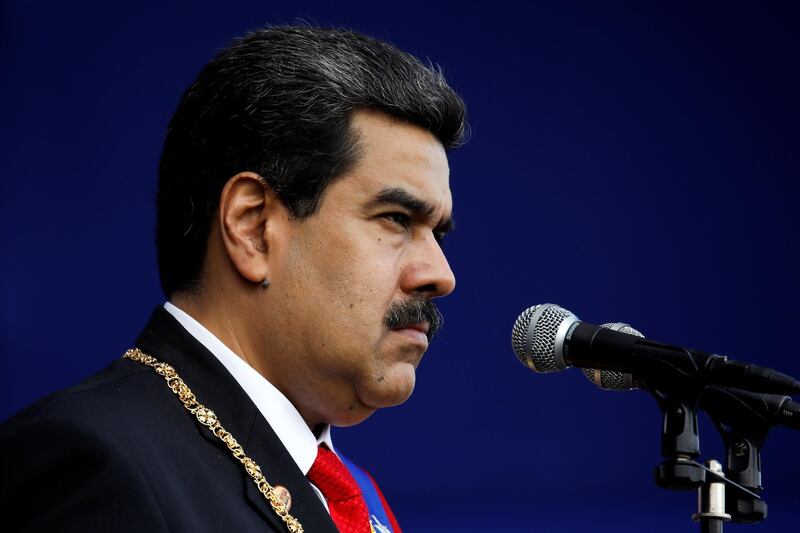Venezuelan President Nicolas Maduro has begun a second term with the economy in ruins and his regime more isolated than ever as regional leaders declared his re-election illegitimate and shunned his inauguration.
The 56-year-old socialist leader was sworn in on Thursday by Supreme Court president Maikel Moreno as an audience of hundreds, including a handful of South American leftist leaders and Venezuela's military top brass, cheered and applauded.
"I swear on behalf of the people of Venezuela … I swear on my life," Mr Maduro said solemnly as he took the oath of office for his second six-year term.
After donning the presidential sash – as well as a ceremonial gold chain bearing the key to the sarcophagus containing the remains of Venezuela's revolutionary leader Simon Bolivar – an ebullient Mr Maduro turned to salute the crowd with a V-sign.
He was re-elected last May in an election boycotted by the majority of the opposition and dismissed as a fraud by the United States, European Union and Organisation of American States.
Even as he was sworn in, the United States said it would not recognise him, and vowed to increase the pressure on his regime.
"The US will not recognise the Maduro dictatorship's illegitimate inauguration," national security adviser John Bolton tweeted.
In a special session in Washington, the Organisation of American States similarly backed a resolution declaring Mr Maduro's government illegitimate.
"Venezuela is the centre of a world war with US imperialism and its satellite governments," the socialist leader retorted in a rambling speech which lasted about two hours.
Mr Maduro also demanded "respect" from the EU, accusing the bloc of "old colonialism" and "old racism" after it said on Thursday that he "lacked any credibility".
The president arrived at the court building serenaded by a choir singing patriotic songs. He blew kisses at a welcoming party of children waving Venezuelan flags, and saluted supporters looking down from the building's multi-tiered galleries.
With the exception of Mexico, the Lima Group – made up of 14 mostly Latin American countries – has urged Mr Maduro to renounce his second term and deliver power to parliament.
Mr Maduro used his speech to call for a summit of Latin American leaders to discuss "with an open agenda all the issues that need to be discussed, face to face!"
Neither the EU nor the Lima Group sent a representative to the inauguration, with Lima Group member Paraguay announcing immediately after the ceremony that it was breaking off diplomatic relations with Venezuela. Peru branded it a "dictatorship".
Leftist presidents Miguel Diaz-Canel of Cuba, Evo Morales of Bolivia, El Salvador's Salvador Sanchez Ceren and Nicaragua's Daniel Ortega were present for the inauguration, as were representatives of Russia, China and Turkey. Mexico sent a low-level diplomat.
_______________
Read more:
[ Trinidad suffers from Venezuela collapse as pirates return to the Caribbean ]
[ Former Venezuela Supreme Court judge flees to US and denounces Maduro ]
[ Venezuela turns to oil minnows as big players stay away ]
_______________
A former bus driver and union leader, Mr Maduro is the hand-picked successor of the late leftist firebrand Hugo Chavez.
He has gained control of virtually all of Venezuela's political institutions and enjoys the support of the military.
But his first term saw an exodus of millions of people escaping economic meltdown. The UN has said more than five million will have fled by the end of this year.
The International Monetary Fund predicts that Venezuela's economy will shrink by 5 per cent next year, with inflation – which reached 1.35 million per cent in 2018 – hitting a staggering 10 million per cent.
Mr Maduro says he feels stronger and more legitimate than ever, but many citizens blame him for Venezuela's economic woes, which have left much of the population living in poverty with shortages of basic foods and medicines.
"This is going to lengthen the agony we have lived through in recent years, everything has seriously deteriorated, basic goods and services are becoming more and more unattainable," said Mabel Castillo, 38.
Thursday's ceremony took place in the Supreme Court rather than the sidelined, opposition-controlled parliament, which has refused to recognise Mr Maduro.
Instead, the parliament on Thursday called on the army, Mr Maduro's bedrock, to formally disavow the president.
While the opposition has tried to dislodge Mr Maduro, it remains fractured, having launched a failed bid in March 2016 for a recall referendum aimed at removing the president from office before the end of his term.
Many prominent opposition figures are either in jail or exile and various factions continue to squabble over power while the National Assembly, the one institution they control, has been left impotent after Mr Maduro created the rival Constituent Assembly and filled the Supreme Court with loyalists who annul every decision made by parliament.
Mr Maduro claims US and EU sanctions cost the country US$20 billion (Dh73bn) in 2018. The opposition says the government's control of foreign exchange, in place since 2003, has generated $300bn in illicit gains.






